Alex reports from the west coast heat storm that made Canada hotter than Baghdad in late June. Hundreds dead. Plus two interviews on animal survival in heat: Canadian scientists Nick Mulvey and Jennifer Sunday, and George Monbiot speech releasing book “Heat” in 2006.
Listen to or download this Radio Ecoshock show in CD Quality or Lo-Fi
Welcome to Radio Ecoshock. I am Alex Smith.
What will climate change be like? Last week it was hotter outside my studio in Western Canada than it was in Baghdad. Not far from us, the hottest temperature ever recorded in Canada, ever, ever, was in the little town of Lytton British Columbia. In the last week of June they set new recorded over 3 consecutive days, culminating at 49.7 degrees C., over 120 degrees Fahrenheit. That just doesn’t happen in Canada. In June.
A giant heat dome settled over Western North America, from California to Canada for over a week of brutal temperatures. The Canadian government weather service said they had never seen a high pressure blocking system like it. We are in an uncharted climate, a massive experiment with an atmosphere changed by human greenhouse gas emissions.
We can see the heat haze as a cloudless sky draws the last moisture out of the soil and the last living plants. The fire danger is off the charts, beyond extreme danger. Sure enough, after three days of setting absolute Canadian heat records, the village of Lytton burned to the ground. Residents noticed smoke. They had only 15 minutes to drive out for their lives. Some did not make it. The village was totally burned out.
The next evening, as this massive weather system began to break down, 29,000 bolts of lightning, most of it “dry lightning” without rain, hit the mountains. Fires multiplied. All over. The highways on both sides of us have been closed by fires now and then over the last few days. We have our evacuation boxes and bags by the door. We have to be ready for our 15 minutes to get out.
As luck would have it, just a few days previously a bolt of lightning struck almost outside my studio. The telephone hybrid that connects me to our expert guests all over the world was destroyed by a surge over the phone line. OK, time for some replays of interviews that predicted all this would happen. Then the system drive on my relatively new computer died. The manufacturer, which sold me two day on-site tech support, has not shown up a week later. I am recording this program on an ancient computer from my basement and uploading it from my phone.
My guests have warned about extreme heat and storms for 16 years now on Radio Ecoshock. This year I published a collection of those interviews, with survival tips. The book “Surviving the Age of Extreme Heat” is available from this link. So it is ironic that when the worst heat hits right here, computer breakdowns made it impossible to report on it.
Here is what it is. The saddest Radio Ecoshock interview ever was with Charlie Veron in Australia. Charles Veron is a scientist and I think the world’s top expert on coral. He dove the Great Barrier Reef since he was young. It would not surprise me to find Charlie spent at least a year of his life underwater. Charlie found and documented more types of coral than any other human being. He published a multi-volume encyclopedia of coral which is still the standard. Coral comes in all kinds of colors and shapes only an artist could dream of.
But now Charlie is not adding new coral. He documents countless species and types which are disappearing as the oceans get too hot. Parts of the Great Barrier Reef are dying in massive bleaching events. Coral serves as a nursery for almost one quarter of the fish in the sea. Later in this show I will play my early feature where a scientist predicts most fish will be gone by 2048.
So Charlie is seeing his life work, creatures in the undersea world, destroyed by climate change. That is sad. Other scientists have also become undertakers for whole forests, or just frogs or bugs, that vanish forever. For my own part, in 2006, I began to broadcast the urgent need to take climate action, to change our lives deeply, to stop burning fossil fuels. We needed to do that within 10 years. Otherwise, experts feared that by 2050 climate change would dominate our lives. They were wrong. In just 15 years, the extremes are here. Now.
You may be thinking “Well that can’t happen here“. Most people do. Canadians never thought they would see temperatures like the Middle East, ever, and certainly not in June. These weather extremes are popping up all over the world. There is nowhere safe to recommend. So, yes, this is about you.
In 2007 the Arctic sea ice melted away and scientists were stunned. This was an obvious and undeniable result of global warming. Since then, other mega-signs are flashing red, including massive meltwaters running off Greenland and mountain glaciers retreating all over the world. Let me add one more. I have several reports that always-frozen snow on the high Rocky Mountains is now melting away. You may recall a recent Radio Ecoshock interview where one of the three sites chosen to study the record in permafrost caves was in the Rockies of British Columbia. That permafrost is probably melting. It is too new for any study to catch it.
What we do know is the snow reserve for water that feeds rivers over the Western United States and Canada – is melting under unprecedented extreme heat. As you know, reservoirs feeding agriculture for the continent, and cities of the West, are lower than anyone has ever seen. Great lakes behind dams have become low stream beds. Unless we get unprecedented rain, rivers feeding the Prairies are also going to reach astounding lows this summer. That is the grain and corn belt.
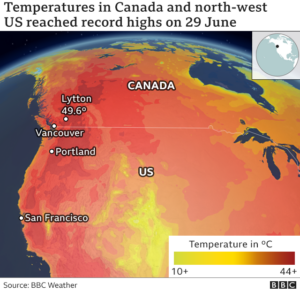
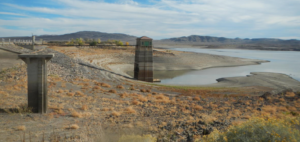
In the West, fruit has burned on the trees. Some trees are dying outright. In fact, whole landscapes are going dead and brown. Then, with any ignition source, they burn. In Lytton British Columbia they suspect a train ignited the tinder-dry brush that burned down the town. We don’t know yet, but it was not a forest fire, even though fires were burning on either side of the town. In these conditions a discarded cigarette or hot muffler can set vast areas ablaze. Earth is becoming more flammable.
West Coast cities have been severely hit by this long-lasting heat wave. I lived in Vancouver Canada for 25 years. I began broadcasting there from the community-owned station CFRO. We never lived in a home with air-conditioning. I never met anyone there who had A/C. In that kind climate moderated by the ocean, extreme heat never happens. Until it did. In the Vancouver area, there have been several hundred excess deaths during the heat wave. The Coroner expects these are heat deaths. There will be hundreds more dead from California through Oregon and Washington State. Even before this, heat kills more people in the Americas, Europe, Russia and Australia than any other weather-related event, including hurricanes and floods.
The heat in Portland was beyond what anyone thought possible. Nothing is built for that. Many of the new apartments buildings have windows that only open a few inches, to prevent people falling out. They pump in fresh air from the roof – a place too hot for any human to venture out.
It goes deeper. We learned from Radio Ecoshock guest Mat Santamouris that humans can adapt to heat, within certain limits of course. So in Darwin Australia, people cope with heat over 100 degrees F, or 35 C. But in London England, when the temperature gets over 90 degrees F, just 32 C – the emergency rooms fill up with people suffering heat symptoms. Likewise, millions of people on the West Coast of North America were not adapted. They had never seen such heat and never expected to. We don’t know how many died yet. The experience was frightening and dangerous for all. Outdoor life was canceled unless you were standing chest-deep in a lake, river or the sea.
Naturally, air-conditioning sales are through the roof. Companies cannot keep up with demand. Even with current installations, the need for A/C to survive drove power consumption to absolute record highs. Once millions more people get air-conditioning, new sources of power will be needed to handle the summer demand. Will that energy come from coal, gas, or oil? How about we bring back those super dangerous nuclear reactors? Either way, this becomes a positive feed-back loop, where heat drives more energy use which drives more greenhouse gas emissions, which brings even more heat.
This civilization is already entering the phase of climate change where we need mechanical help to survive.
This civilization is already entering the phase of climate change where we need mechanical help to survive. That was not the case in any human history. Now it is. There are all sorts of ramifications, including even great dependence on the grid and the centralized corporations and governments which try to guarantee that power. Heat changes the economy, production, and even your form of government. Eventually, it seems possible all of those will break down, as a rapid climate shift tears away parts of the system.
Now our challenge is hard but absolutely necessary. We need to slow down this greenhouse. It is too late to stop climate change that is already here. But we can save a planet worth living on – for our descendants. We can and must prevent Hell from arriving.
I am recording this show with a little hand-held microphone on an antique computer. My apologies that I cannot do more to cover the greatest heat event so far in North America. But there will be more and worse. My studio should be working soon.
ALSO IN THIS PROGRAM
So what else do I have for you? Information you need. Most of you have never heard these early Radio Ecoshock productions, which were only broadcast in Vancouver Canada. We have two interviews on the coming extreme heat and why it happens, both from 2006. Obviously not enough people heard these experts, or we could not be in the current situation. We wrap up with that warning from Canadian scientist Boris Worms: at our current pace, fish will be gone from the sea in 2048. Twelve years later we are well on our way to fish Armageddon. I hope you will take time to hear about that now.
The Real Story
Life goes on. My wife and I did not die during the pandemic. We may have to flee from fire this summer. These are extraordinary times. But keep this in mind: no matter what human history does, from glory to horrible mass murders, those are minor blips. When the mountain snows all melt, the Arctic becomes ice-free, when the Amazon rainforest converts to grass, when new deserts appear where farms once were – the inescapable single story of this time is climate change.
We are not an abstraction. Humans live in water systems, certain heat ranges, and depend utterly on other life forms that take millennia to millions of years to adapt to climate. We cannot force those things to change in one or two hundred years and still survive.
I dedicate what is left of my life and my ability to help as many people as possible know about the danger, learning from the greatest experts I can find. The next step is up to you as the listener. Will you act? Learn about science and climate. Get my past programs free. Find the science on YouTube. Don’t be distracted by B.S. and vested interests. Find what we can prove is true.
Then consider: what can we do, even as the pandemic drags on in many countries? How can we network from people we know to the top politicians. Several guests on this show laid out ways for citizen activism on climate change. There is no technology to save us. Only slashing carbon emissions, personally and as a global society, can prevent Hell on Earth.
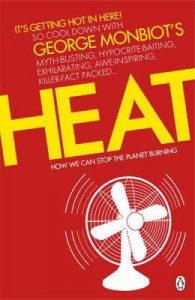
We begin with UK author and Guardian columnist George Monbiot. He spoke in a London book store, after the launch of his book “Heat” in 2006. I doubt anyone else has this audio now. Monbiot hits it out of the park on the coming heat and what we must try to do about it. This is a problem almost beyond our comprehension he says, and even our love for one another may help wreck the atmosphere. George is talking about “love miles” – when we fly far for a wedding, funeral, or other love reasons. Even that is filling the sky with dangerous carbon pollution that could doom us all.
But humans are not alone suffering and dying in the excess heat of climate change. We follow up with my interviews with Dr. Nick Mulvey of Simon Fraser University, and now Dr. Jennifer Sunday of McGill on the heat tolerance of animals.
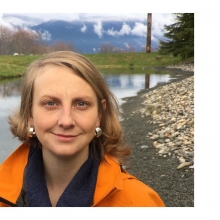
Dr. Jennifer Sunday, McGill
Even fish in the ocean are at risk – from warming waters, changing food system, land-based pollution, destruction of habitat including coral, and massive over-fishing. One Canadian scientist predicted there would be no more fish in the sea by 2048. That is from the respected Maritimes fisheries expert Dr. Boris Worm at Dalhousie University in Nova Scotia.
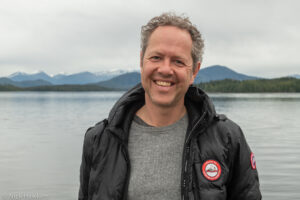
Dr. Boris Worm, Dalhousie University, Canada
I prepared a Radio Ecoshock special on that, broadcast only in Vancouver Canada on CFRO Co-op Radio. That was in 2006. Now 15 years later we seem well on the way toward fish apocalypse. Please take time to learn about it. You hear a younger Alex Smith with Radio Ecoshock in it’s first year, 2006, as broadcast from the studios of CFRO Co-op Radio in Vancouver.
I’m still reconstructing my studio computer, this time I hope with a more bullet-proof electric shield and backup. Anyone who wants to donate toward new equipment costs can do it here. My deep thanks to all those who have helped already.
Thank you for listening, and caring about your world.